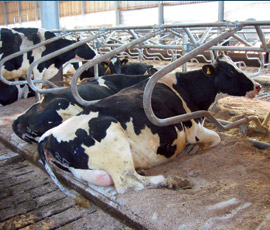Scots government issues recycled gypsum warning

Farmers have been warned not to use recycled gypsum for animal bedding because it poses significant risks to human and animal health.
Scotland’s environmental regulator, the Scottish Environment Protection Agency, said it was unlikely to grant a licence for recycled gypsum to be used as bedding because the risk was so high.
Stephen Field, SEPA’s land unit manager, said: “The disposal of plasterboard, gypsum and gypsum-containing wastes can lead to the production of the toxic gas hydrogen sulphide (H2S). Due to its high levels of sulphate, gypsum – and wastes with similar properties – cannot be landfilled with biodegradable waste in Scotland.
“When used in animal bedding, it is likely waste gypsum will produce considerable levels of H2S, due to the damp, non-ventilated conditions. In such circumstances, H2S presents a significant risk to animal and human life, as well as the environment, and we would advise against anyone using it for this purpose until there is clear, scientific evidence to demonstrate it does not pose such a risk.”
The advice was welcomed by the Scottish Agricultural College, which issued a special hazard alert to livestock farmers earlier this year following reports of unusual circumstances surrounding the death of four cattle in the Borders linked to the toxic gas produced from a slurry store. Waste plasterboard containing gypsum had reportedly been involved.
NFU Scotland welcomed the clarification of the legal status of using gypsum as bedding, but asked for time for livestock producers to adapt their systems to other bedding sources.
A spokesman added: “The health of farmers, their staff and their stock is paramount and it is clear that mixing waste gypsum with slurry poses a genuine threat.
“We have spoken to SEPA today and they confirmed they will be adopting an advisory role and we will look to work with them in delivering information to farmers on the removal of gypsum from livestock bedding.”
